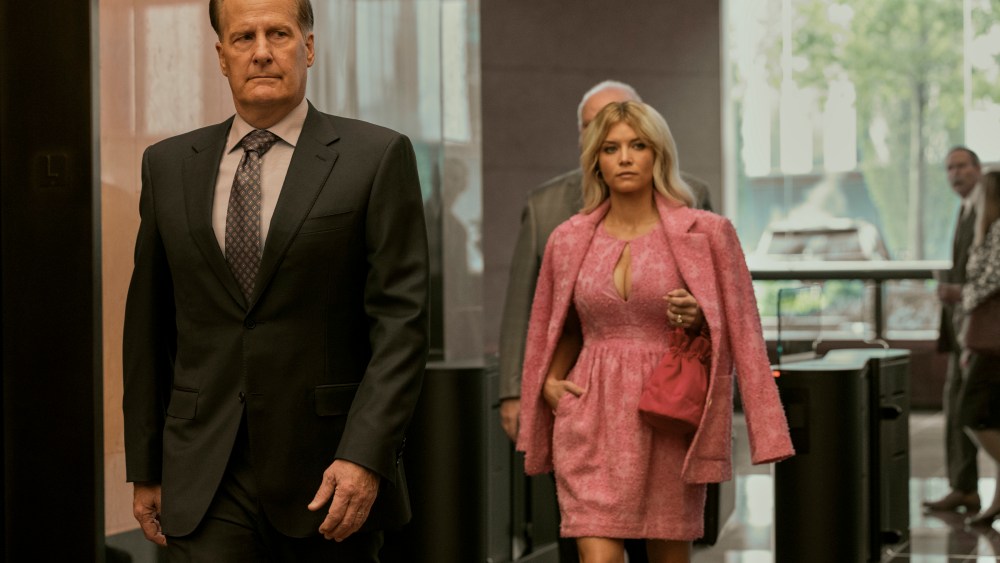“A Man in Full,” the sprawling Tom Wolfe novel now adapted by screenwriter David E. Kelley into a limited series for Netflix, centers on a protagonist who, for all his resources, can’t bend the world to his will. Over six episodes, the show finds itself in a similar bind. “A Man in Full” boasts an all-star cast, led by Jeff Daniels as Atlanta real estate tycoon Charlie Croker; an Oscar-winning multi-hyphenate behind the camera; and a dense lode of source material. But the show ends up far less than the sum of its parts, an oddly generic and muted take on a larger-than-life American story.
Wolfe spent the bulk of his career as a longform journalist before turning to fiction. His first novel, “Bonfire of the Vanities,” was a social satire of 1980s New York that helped define the Wall Street boom’s impact on culture. (If you’ve ever described someone as a “Master of the Universe,” you have Wolfe to thank.) For his sophomore effort, Wolfe kept the anthropological lens of a lifelong reporter while turning his gaze southward. Like “Bonfire,” “A Man in Full” sets the karmic comeuppance of a wealthy, white businessman against a backdrop of racial inequality, rank cynicism and political maneuvering. It’s a story rich with the level of detail that rewards an expanded canvas, much like James Clavell’s “Shōgun” and its excellent adaptation that aired earlier this year on FX.
But from such opportunity, “A Man in Full” makes a thin gruel of overheated performances and undercooked commentary. The show begins abruptly, without much to situate us in Charlie’s world besides a Shania Twain performance at his 60th birthday party to demonstrate his pull. Before the audience has more time to orient themselves, they’re thrown into the brewing conflict between Charlie and Harry Zale (Bill Camp), a bank executive who’s made it his mission to take Charlie down by demanding payment on $800 million in loans. Charlie and Harry may be set up as adversaries in business, but they’re monotonously alike as people, both booming ridiculous bits of masculine bravado across a conference room table. “This bank rolls to its glory on my back!” Charlie shouts. “Part of being a man is being able to kick another man’s ass,” Harry growls.
If this sounds campy in an enjoyable, intentional, “Billions”-adjacent way, the (many) scenes that riff on this motif play disappointingly flat. Regina King, who boasts a deep portfolio of directing credits on top of her work as an actor, helms three episodes, including the premiere; Thomas Schlamme, who helped create Aaron Sorkin’s famous walk-and-talk style on “The West Wing,” takes the other half. Despite the pair’s filmographies, the look of “A Man in Full” is overlit and unspecific. There’s neither the sense of place one might crave from an inherently Southern story nor the sumptuous excess one expects from a “Succession”-esque saga of obscene wealth in terminal decline. Worst of all, the tone is bizarrely lacking in the maximalist humor that helped Wolfe craft so many indelible scenes. The result is an odd mismatch between the show itself — inert, straight-faced — and the isolated bits of Wolfe-ian absurdity that survive. Proper nouns like Turpmtime (a quail-hunting plantation Charlie insists on calling an “eco-lodge”) and Raymond Peepgrass (Harry’s deputy at the bank, played by Tom Pelphrey) don’t belong in the prosaic drama they’re now stuck in.
Besides slimming down the plot to fit in just five hours of screen time, “A Man in Full” also brings the action to the present day. (Wolfe published the novel in 1998.) The shift seems designed to add contemporary resonance to subplots centered on a local mayoral election and the criminal justice system, respectively. Croker’s legal fixer Roger White (Aml Ameen) bridges both, advising incumbent mayor Wes Jordan (William Jackson Harper) in his campaign against a Trumpian challenger and representing Conrad Hensley (Jon Michael Hill), the husband of Charlie’s pregnant assistant, when he’s charged with assaulting a police officer. But the modern setting mostly serves to make these subplots yet another attempt to invoke the issues of the current moment without much to differentiate this particular take. On the other hand, dated and retrograde elements like Peepgrass getting sued for child support by a Finnish model who sexually coerced him feel pulled out of time.
If nothing else, “A Man in Full” ought to be a compelling character study. But Croker never comes into focus because the people around him never do, either. His ex-wife, Martha (Diane Lane, criminally underused), is an ancillary presence at best; we never get the sense how she feels about her former partner, nor why she would suddenly go on some dates with, of all people, the dweeby banker Peepgrass. Lucy Liu is somehow less utilized than Lane as Martha’s friend Joyce, another waste of charismatic talent. And while we’re told Croker’s current spouse Serena (Sarah Jones) is shrewder than the trophy she’s often dismissed as, we’re given few chances to see it.
All these vaguely sketched women leave the titular man to hold up the show on his own. Daniels is a justly decorated actor, but his Croker has only a handful of notes, including a Foghorn Leghorn accent and reckless machismo. Were “A Man in Full” to go as all-in on Croker does on ridiculous pomp, there might be a closer match between tone and subject. But as it is, “A Man in Full” leaves too much empty space.
All six episodes of “A Man in Full” are now streaming on Netflix.





